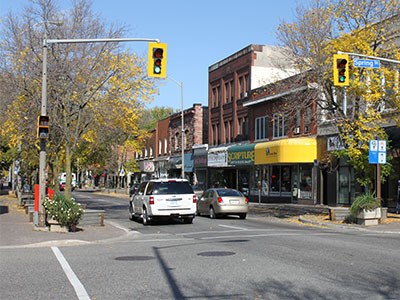The Queenstown Business Improvement Area (BIA) is implementing changes members anticipate will result in a more streamlined process for governing downtown activity.
Formed in 1973, the BIA’s boundary incorporates a six-block radius that covers about half of Queen Street. In early October, the city appointed an interim board to sit down and re-examine the BIA’s policies and procedures, and a permanent board will be elected later this fall.
The development comes after two years of strife, in which a group of dissenting members launched a process under the Municipal Act to have the BIA disbanded.
Dom Ruscio, a BIA member who owns the Days Inn, said he started asking the board two years ago for accountability in a number of areas, including the BIA’s mandate, budget, membership list, and levy. But Ruscio said he was rebuffed and took the repeal route as a last resort.
“We brought these questions and concerns to the association and the chair, and the board basically told us to go away: ‘Everything is fine. Everything is great. How dare we ask these questions,’” he said.
As one of the largest landholders in the BIA, he pays one of the highest levies, but said he hasn’t seen value from the organization for years. He argues the boundary should be expanded, which would bring in more members and include the entire downtown.
Ruscio also wants a more equitable distribution of the levy. Landowners included in the BIA are mandated to pay a levy in addition to their municipal taxes.
He estimates 20 per cent of BIA members are paying 90 per cent of the levy. But many, like him, who have commercial properties, don’t derive any benefit from the BIA-hosted events, which draw people downtown.
“So here we are paying our taxes and being mandated to pay additional taxes,” Ruscio said. “Does no one see a problem with this?”
Ruscio said he doesn’t mind contributing to the levy, but wants to see a restructured BIA, which would include a larger area, more accountability, and a levy structure that recognizes retail versus commercial properties.
Duane Moleni, who was hired as the BIA’s manager in April, agrees many of its policies are outdated and the organization needs restructuring in a number of areas.
The interim board’s priority will be to work on the organization’s governance policies and ensure its compliance with the bylaw, he said.
“That is an important step for this interim board to take so that when the new board is appointed, they’re stepping into a fully functioning cohesive environment, and they know the roles that they’re getting themselves into,” Moleni said.
In particular, the organization needs to clearly define its mandate and goals, something that had been lacking for the last several years, Moleni said. The BIA had been concentrating on hosting events and using them to draw community members into the downtown.
“There’s nothing wrong with that, but if you don’t have these laid out, clearly defining your goals and objectives, just even for purely events, how can you go back and measure against them?” Moleni said.
He believes sometimes it’s more important for an organization to address its in-house challenges before it can start to address community challenges.
“I think the repeal process that happened was the time to go back and say, ‘OK, there are some things we’re failing at here. Let’s stop and take the time to do it right.’”
Ruscio said that was always his goal.
“We’ve got some really good people on the board right now, from both sides, which is great,” he said. “I think they’re prepared to start dealing with us, which is all we really wanted.”




